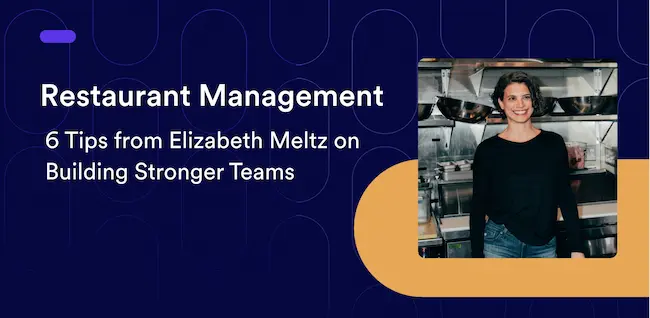In the vibrant world of culinary innovation and entrepreneurship, Chef Reem Assil stands out as a multifaceted personality, embodying the spirit of a true badass.
Reem Assil's culinary journey took root in her Palestinian Syrian upbringing, influencing her approach to food and community. As the founder of Reem's California, a restaurant nestled in the Bay Area, Reem has not only crafted delectable dishes but also established a culinary haven that reflects her cultural roots.
Her commitment to culinary excellence has garnered accolades, including a James Beard Award nomination and recognition as a Rising Star Chef. Reem's restaurant has been celebrated as one of the Top 10 new restaurants in America by Food and Wine.
Recently featured on The meez Podcast hosted by Josh Sharkey, Reem delves into her background, achievements, and the intriguing influence of poker on her business philosophy.
8 Key Takeaways from Chef Reem Assil's Culinary Journey
1. Poker is a metaphor for smart decision-making
Reem's introduction to poker during a transitional phase in her life provided her with a unique perspective on decision-making. The game, she argues, goes beyond mere chance; it involves assessing one's position, understanding implied odds, and considering various factors akin to the multifaceted decisions made in business. For Reem, poker became a tool for self-discovery and confidence-building. The poker table allowed her to embrace an alter ego, enabling her to take risks and assert herself.
“I was timid. I was afraid of taking chances. I was afraid of being assertive. You get to be this alter ego where you can kind of go for it at the poker table. And so as I played more poker in my real life, I became more confident. So I think there was something about that sort of meta-psychological piece.”
2. A long-term vision requires emotional control
One of the most significant lessons Reem gleaned from poker was the importance of maintaining a long-term perspective. She stressed the need to avoid getting overly attached to success or disheartened by setbacks. In the volatile world of both poker and business, Reem advocates for a steady focus on long-term goals, emphasizing the inevitability of ups and downs and the necessity to make decisions with imperfect information.
“I think the biggest lesson that I learned from poker is how not to get caught up with the upswings or the downswings. There are inevitable ups and downs in circumstances you can't control. You have to make decisions with imperfect information. You have to not get too attached to the ups and not get too attached to the downs and kinda play the long game. That's always how I've viewed my business.”
3. Hierarchy isn’t necessary to be a great chef
Reem's perspective on the title of "chef" challenges conventional norms in the culinary industry. She questions the hierarchical structure often associated with chefs, noting that the centralization of power can lead to abuses. Reem advocates for a shift towards a more inclusive approach, where everyone's voice is heard, and the focus is on collaboration rather than a singular authority figure.
“It doesn't matter who the chef is, the very setup of the chef being central to everything - the one that is the magic creator where everybody else is invisibilized around them - is the problem in and of itself. It creates this false paradigm that people are aspiring to, where they're falling into these same abuses of power, myself included. Nobody is immune from that.”
4. Core values need to be set in stone before scaling
Utilizing the Traction model, she emphasized the importance of core values in hiring and evaluating employees. This strategic foundation serves as a guiding light, influencing every aspect of the organization, from hiring processes to daily operations. The brilliance lies in its simplicity – decide on five core values that encapsulate the ethos and principles that define the business.
“Decide on the five core values of your business and then in everything that you do, even in your hiring process and your evaluating process, you evaluate and hire people against those values. It brings the people that you want into your organization so you don't have to do a lot of work on the front end. And then it reminds us when we all fall off of our guns.”
5. Progressive leadership is worker ownership
Chef Reem envisions the transition of Reem's to a worker-owned enterprise, where employees have a material stake in the business. This approach, coupled with an apprenticeship program focused on holistic skill development, empowers employees to think like owners and strengthens their connection to the business.
“My 10-year vision was always to have Reem's worker-owned. We built an apprenticeship program where workers got to learn tools outside of the kitchen, like how to communicate better, and how to understand the finances of a restaurant. And so now they're thinking like owners. And the hope is that once we make the transition to worker ownership, then they have a material stake in the business, and I think that that helps with loyalty.”
6. Democratizing decision-making builds strong team leaders
Chef Reem advocates for participatory management in her business, a style that involves employees in decision-making processes. Transparent communication and democratic participation ensure that every team member's voice is heard. This approach not only promotes a culture of cooperation but also fosters a sense of collective responsibility and shared success.
“We involve people in all the decisions we make, and it's very clear that pretty much every employee is consulted. For example, with the health and safety of workers, when we decided to open up during the pandemic, that was a vote. We were like, we're not going to open up until all of our workers feel safe. So there are certain things that we've already kind of instilled in Reem's as if it's a cooperative.”
7. Being inclusive demands language justice
Her restaurant, Reem's, experiences a mix of employees from different socioeconomic backgrounds, ages, and language preferences. To address this, Reem implemented the concept of language justice, ensuring that meetings are simultaneously interpreted to accommodate diverse language preferences.
“One of the things we incorporated at Reem's during the pandemic was this core tenant of language justice, which means that all of our meetings are simultaneously interpreted. Everybody gets to participate in the language that they feel most comfortable in, and that really helps participation, when you can actually express yourself. So I think those have been the big learning lessons of, "how do you hold a multi-generational, multiracial, multi-language workspace.”
8. Arab Hospitality equals generosity
Reem described Arab hospitality as a concept that goes beyond cultural boundaries. It involves offering abundance, generosity, and a sense of community to everyone. The focus is on creating an inclusive space where guests play an active role in the experience. The restaurant aims to break away from the traditional service industry model and aligns more with the Arab way of hospitality, accepting individuals as they are.
“If I were to describe Arab hospitality, in a nutshell, it's like sweet torture. Let me just give you everything that I have, make you feel abundance, even if it's the last thing that I have. You know, I think the Arabs have really survived in the desert and everywhere they've traveled by being gracious to their friends and enemies alike. By just being generous. You know you've really done your job is like stuffing someone to the brim.”
Conclusion:
Chef Reem Assil's journey offers profound lessons for aspiring entrepreneurs and leaders. From the poker table to the kitchen and beyond, Reem's approach underscores the importance of self-discovery, long-term vision, collaborative leadership, and a commitment to values. As she challenges traditional notions of a chef, Reem paves the way for a more inclusive and sustainable future in the culinary world.
Listen to the full conversation with Chef Reem on The meez Podcast.


.png)

.webp)



